Here they are…the rhythm value cards I mentioned in my post yesterday!
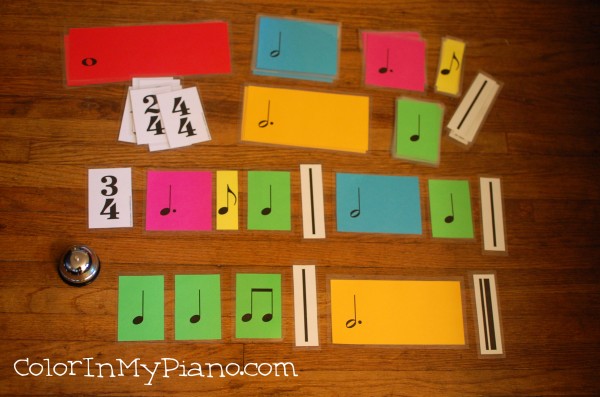
Continue reading “Rhythm Value Cards for Dictation and More”
Here they are…the rhythm value cards I mentioned in my post yesterday!

Continue reading “Rhythm Value Cards for Dictation and More”
On Saturday, I held a Piano Party for my students. It was basically a group lesson and rehearsal for our Spring Recital which is coming up in a few weeks. Most of my students have never met each other, so this was a good opportunity for them to learn a little about each other and to share their pieces. I’d like to hold group lessons more regularly now that I have enough students to do so…..so this was a good start!
Here’s what we did:
I had a wonderful extended weekend in Michigan, giving my presentations and spending time with my family! Now I’m busy back at work, playing catch-up. 🙂 However, I do have a little game I’d like to share with you today.
I am not the original inventor of this game, I’m sure — but in case you haven’t seen it before, here’s how to play this keyboard game with your beginner students!
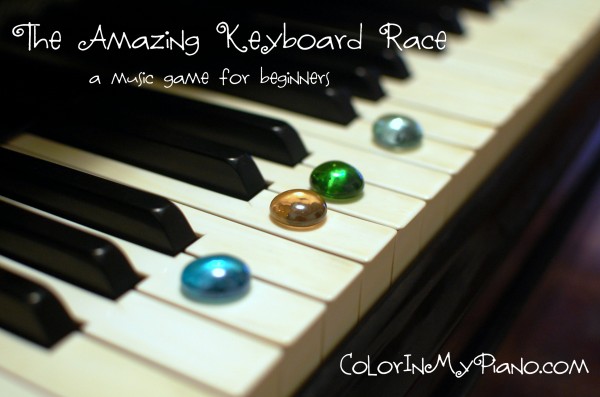
I have a new game to share today: Piano Finger Twister!
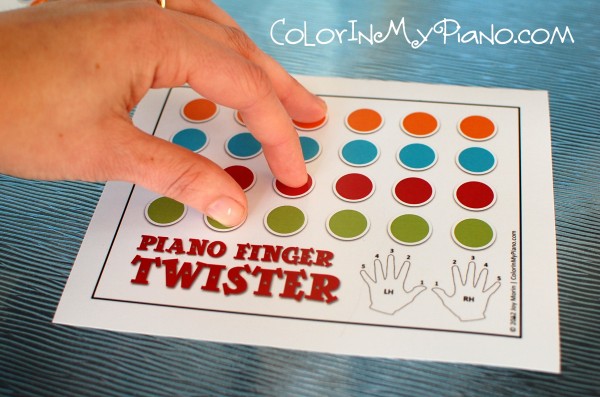
I’ve been wanting a floor staff for a long time. Now I finally have one!
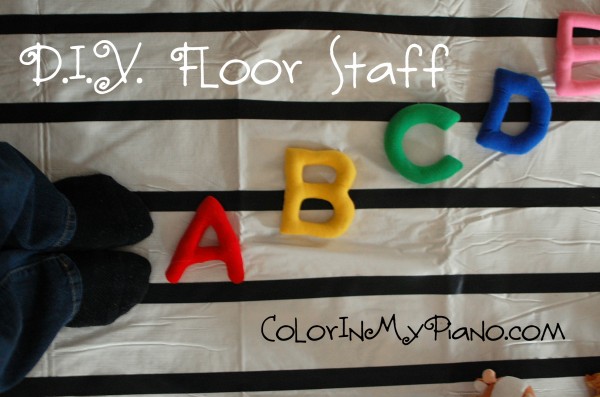
My Homeschool Class and my Piano Readiness Class both recently finished their Musical Instruments Workbooks. We usually complete just two pages each class, so it took us awhile to get through it!
Now that we’ve finished it, we’ve been playing a fun little sorting/quizzing game using the deck of instrument cards that came with my MiniMusic kit. This competitive game has been quite a hit!
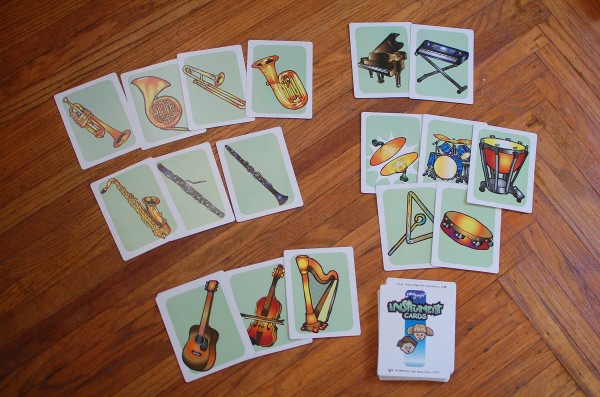
Continue reading “Musical Instruments Quizzing/Sorting game”
As promised, here is a slideshow of photos from my student’s recent Christmas recital/party. Enjoy!
httpv://www.youtube.com/watch?v=8O2V5khQ-4A
Click here to read about the three games we played after the recital.
Well, my students’ Christmas party/recital was a success! What a great way to finish off the year.
The recital took place in my home. Whenever my college music history textbooks mentioned Schubertiads, I used to dream about the idea of having informal music performance parties in my home. Since my studio is still small, I thought having our Christmas recital in my home would be so fun! About 25 people attended, which is probably close the max that I can fit. Next year I’ll have to find another location, or hold the party with just the students. But it was nice and cozy this year!
We kicked off the party with the recital portion, and then we played three music games:
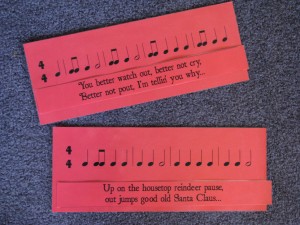 Christmas Carol Rhythm Matchups — This game from Jennifer Fink’s Pianimation blog was a great hit with students! Students worked together in a huddle on the floor to match the rhythms to the Christmas song lyrics. They were able to successfully complete all three levels of difficulty! Even the youngest beginners were able to match a few. I ended up with three students who played “Jolly Old Saint Nicholas” during the recital because I have so many little beginners right now. They were definitely able to help match that pair! 🙂
Christmas Carol Rhythm Matchups — This game from Jennifer Fink’s Pianimation blog was a great hit with students! Students worked together in a huddle on the floor to match the rhythms to the Christmas song lyrics. They were able to successfully complete all three levels of difficulty! Even the youngest beginners were able to match a few. I ended up with three students who played “Jolly Old Saint Nicholas” during the recital because I have so many little beginners right now. They were definitely able to help match that pair! 🙂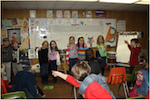 Make Me A Rhythm! game — This is a game I found on a forum and shared about a few weeks ago. This game wasn’t a total success, I’ll admit. My students were very, very shy about asking other students to be note values as they composed a rhythm. After all, this is the first time they’ve met each other. Next time I use this game, I’ll use it with a smaller group (maybe in a setting where students are present without their parents), or with a group of people who know each other better. It wasn’t a total flop though. It’s a great game for visual learners. The “composer” had to think about how many beats they had left in their measure. Once each rhythm was composed, we clapped it together to see how the composers’ rhythm sounded. It was fun, it just went slowly since students took a long time to choose.
Make Me A Rhythm! game — This is a game I found on a forum and shared about a few weeks ago. This game wasn’t a total success, I’ll admit. My students were very, very shy about asking other students to be note values as they composed a rhythm. After all, this is the first time they’ve met each other. Next time I use this game, I’ll use it with a smaller group (maybe in a setting where students are present without their parents), or with a group of people who know each other better. It wasn’t a total flop though. It’s a great game for visual learners. The “composer” had to think about how many beats they had left in their measure. Once each rhythm was composed, we clapped it together to see how the composers’ rhythm sounded. It was fun, it just went slowly since students took a long time to choose.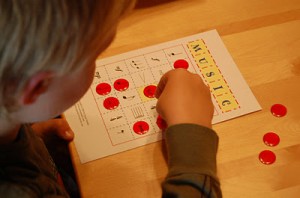 Music Bingo — I LOVE Susan Paradis’ version of Music Bingo. You won’t find a nicer version of Music Bingo anywhere! I’ve used Susan’s version of Music Bingo in previous years for other events (see some photos here). Both the students and parents really enjoyed playing this game!
Music Bingo — I LOVE Susan Paradis’ version of Music Bingo. You won’t find a nicer version of Music Bingo anywhere! I’ve used Susan’s version of Music Bingo in previous years for other events (see some photos here). Both the students and parents really enjoyed playing this game!
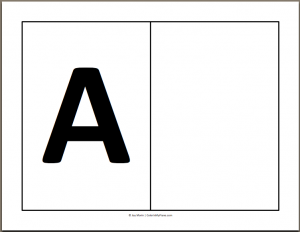 This is a simple game to play with groups of students that makes note-naming flashcards a bit more interesting. It involves sorting the flashcards onto alphabet letter signs on the floor, as pictured on the right (the “A” flashcards would go in the blank space on the right side of the page).
This is a simple game to play with groups of students that makes note-naming flashcards a bit more interesting. It involves sorting the flashcards onto alphabet letter signs on the floor, as pictured on the right (the “A” flashcards would go in the blank space on the right side of the page).
The game is pretty flexible, because beforehand you can sort out exactly which flashcards you want to focus on with your students. This also allows you to control how long you wish the game to continue.
You can also use different flashcards. With my Homeschool Music Class this week, we used my Piano Key naming flashcards (they came with the MiniMusic set I purchased earlier this year). With my Piano Readiness Class, we’ve been doing on-staff work so we used regular staff-note-naming flashcards (I use this set from Faber & Faber, but any flashcards will do).
Another tip with this game: if you are using the note-naming flashcards, arrange the musical alphabet signs on the floor in a column, so that A is at the bottom and G is at the top. I recommend this because this arrangement resembles the staff, where the musical alphabet progresses vertically. If you are using piano-key-naming flashcards, I would arrange the signs on the floor horizontally, just like the keyboard.
Download the pdf of the alphabet signs and detailed gameplay instructions by visiting the Printables > Games page. Scroll down to the M’s for “Musical Flashcard Sorting game.”
 Musical Flashcard Sorting game (1.2 MiB, 13,441 hits)
Musical Flashcard Sorting game (1.2 MiB, 13,441 hits)
 I was recently browsing some forums online and found a description of this game by a music educator. It sounds like a great game to use with large groups of students — perhaps for group lessons or summer camps. I asked the music educator if I could post about the game on my blog, and she kindly agreed. In her own words: “You certainly have my permission to share the game. I made it up, but someone else probably has, too. We all get ideas from one another and put them together in different ways.” I love her attitude and generosity! We teachers have so much we can share and learn from each other.
I was recently browsing some forums online and found a description of this game by a music educator. It sounds like a great game to use with large groups of students — perhaps for group lessons or summer camps. I asked the music educator if I could post about the game on my blog, and she kindly agreed. In her own words: “You certainly have my permission to share the game. I made it up, but someone else probably has, too. We all get ideas from one another and put them together in different ways.” I love her attitude and generosity! We teachers have so much we can share and learn from each other.
This composing/rhythm game is appropriate for groups of about 8 or more students. All you need are 4 pieces of paper with the numbers 1, 2, 3, and 4 written on them. These sheets serve to mark the beats of the measure, spaced out on the floor. One student is chosen as the Composer, who must select students and make them into quarter notes/half notes/whatever. Once the measure is complete, everyone claps the rhythm and the teacher records the rhythm onto a whiteboard to save it. A new Composer is chosen to compose the next measure. In the end, everyone claps the entire rhythmic composition to see what it sounds like.
I haven’t tried out this game yet, but it sounds fun! And it’s not always easy to find games that work for large groups of students. I just might try out this game at my studio Christmas party coming up. 🙂
Complete game instructions can be printed by downloading the pdf on the Printables > Games page. I thought the game needed a more specific title, so I came up with “Make Me A Rhythm!”
About year ago, Sheryl Welles posted on her blog about a “Twister Hopscotch” game that she modified into a wonderful music game. Basically, all you have to do is use Avery circle stickers of some kind to make the spinner into a music spinner with rhythmic note values.
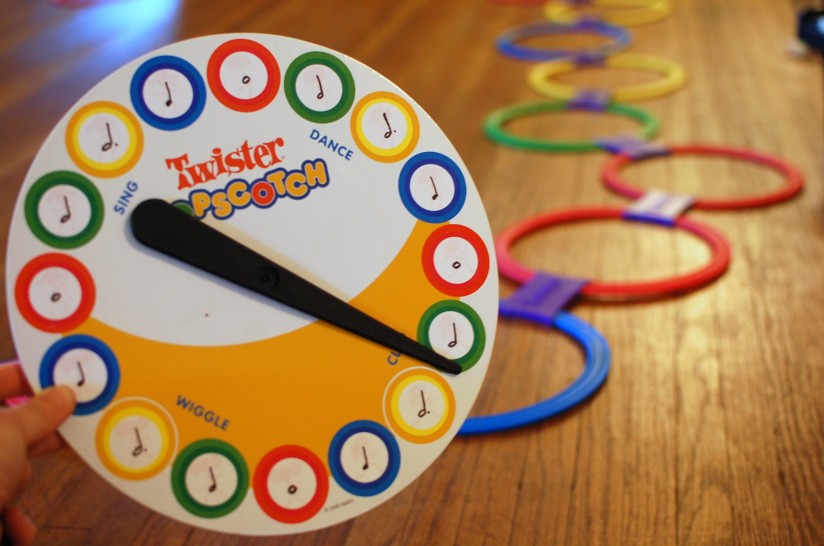
 This is a short music game I created as a way to reinforce the names of the piano keys with young beginners. It only takes a few minutes to play, but my students seemed to enjoy it. It gives them a break from the usual drill I do, where I have them find 3 different C’s on the piano, etc. 🙂
This is a short music game I created as a way to reinforce the names of the piano keys with young beginners. It only takes a few minutes to play, but my students seemed to enjoy it. It gives them a break from the usual drill I do, where I have them find 3 different C’s on the piano, etc. 🙂
Here’s how it works:
You’ll need to buy fabric or foam leaves and mark each with a letter from the musical alphabet using a marker or felt tip pen. The student is instructed to match each leaf to it’s spot on the tree, until the whole tree is filled. The game only takes a few minutes, so it’s a great game to do on the piano bench at the beginning or end of a piano lesson.
Any leftover fabric leaves can be used to decorate your Thanksgiving day table in a few weeks. 🙂
To Download: go to the Printables > Games page and scroll down to “Musical Leaves Matchup game.”
Your Cart is Empty